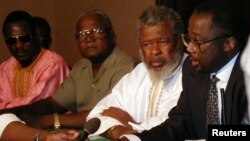DAKAR —
A man suspected of heavy involvement in the transfer of arms and “blood diamonds” during Sierra Leone’s brutal civil war has been found living in the capital city, Freetown. Rights groups are calling for a criminal investigation of Ibrahim Bah, who was a top associate of former Liberian president Charles Taylor during the conflict.
Senegalese national, Ibrahim Bah, has been under a U.N. travel ban since 2004 for his alleged role in helping former Liberian president Charles Taylor support Sierra Leone’s Revolutionary United Front rebel group. That support helped destabilize the country, while granting Taylor access to Sierra Leone's diamonds.
Last year, the U.N.-backed Special Court for Sierra Leone found Taylor guilty of war crimes and crimes against humanity, sentencing him to 50 years in prison. In their ruling against the former Liberian president, judges said Bah was a “trusted emissary” between Taylor and the rebels, who killed and maimed thousands of people during the war.
Bah’s whereabouts were unknown until last month, when a U.N. expert panel placed him in Freetown, saying he had been living there since 2008.
The executive director of the Center for Accountability and Rule of Law in Sierra Leone, Ibrahim Tommy, said it is important that all main perpetrators be tried for their actions during the civil war, even if they were not as famous as Taylor.
"Ibrahim Bah was one of the key supporters, one of the key aides to former Liberian president Charles Taylor and the RUF, who helped him pillage Sierra Leone’s diamonds and even allegedly committed forced labor and enslavement against the people of Sierra Leone," Tommy said. "We think that bringing him to justice will help combat the impunity gap that currently exists in the country, particularly for mid-level commanders who participated in the conflict, but also for foreign nationals whose only interest in the conflict in this country was to loot our resources."
The report detailing Bah’s whereabouts was published on May 31. According to a U.N. statement, Sierra Leonean authorities arrested Bah less than a week later.
A Sierra Leone police official said Wednesday that someone going by the name Ibrahim Bah had been arrested, but then released on bail after he denied being the same person accused of associating with Taylor during the war. The official, Morie Lengor, said police are working with Interpol to confirm Bah’s identity.
Tommy said it would be important to have Bah tried in Sierra Leone. Because of security concerns, Taylor was tried in The Hague, far removed from the region he destabilized for years.
"The most important significance, I would think, is that it would certainly demonstrate the government’s commitment to promoting accountability and to even strengthening our national accountability mechanisms," said Tommy.
Human Rights Watch has also joined the call for Bah to be investigated and possibly prosecuted.
In a statement Wednesday, the New York-based watchdog noted the case would be the “first purely domestic prosecution” concerning international crimes committed during Sierra Leone’s 11-year conflict, which ended in 2002.
Senegalese national, Ibrahim Bah, has been under a U.N. travel ban since 2004 for his alleged role in helping former Liberian president Charles Taylor support Sierra Leone’s Revolutionary United Front rebel group. That support helped destabilize the country, while granting Taylor access to Sierra Leone's diamonds.
Last year, the U.N.-backed Special Court for Sierra Leone found Taylor guilty of war crimes and crimes against humanity, sentencing him to 50 years in prison. In their ruling against the former Liberian president, judges said Bah was a “trusted emissary” between Taylor and the rebels, who killed and maimed thousands of people during the war.
Bah’s whereabouts were unknown until last month, when a U.N. expert panel placed him in Freetown, saying he had been living there since 2008.
The executive director of the Center for Accountability and Rule of Law in Sierra Leone, Ibrahim Tommy, said it is important that all main perpetrators be tried for their actions during the civil war, even if they were not as famous as Taylor.
"Ibrahim Bah was one of the key supporters, one of the key aides to former Liberian president Charles Taylor and the RUF, who helped him pillage Sierra Leone’s diamonds and even allegedly committed forced labor and enslavement against the people of Sierra Leone," Tommy said. "We think that bringing him to justice will help combat the impunity gap that currently exists in the country, particularly for mid-level commanders who participated in the conflict, but also for foreign nationals whose only interest in the conflict in this country was to loot our resources."
The report detailing Bah’s whereabouts was published on May 31. According to a U.N. statement, Sierra Leonean authorities arrested Bah less than a week later.
A Sierra Leone police official said Wednesday that someone going by the name Ibrahim Bah had been arrested, but then released on bail after he denied being the same person accused of associating with Taylor during the war. The official, Morie Lengor, said police are working with Interpol to confirm Bah’s identity.
Tommy said it would be important to have Bah tried in Sierra Leone. Because of security concerns, Taylor was tried in The Hague, far removed from the region he destabilized for years.
"The most important significance, I would think, is that it would certainly demonstrate the government’s commitment to promoting accountability and to even strengthening our national accountability mechanisms," said Tommy.
Human Rights Watch has also joined the call for Bah to be investigated and possibly prosecuted.
In a statement Wednesday, the New York-based watchdog noted the case would be the “first purely domestic prosecution” concerning international crimes committed during Sierra Leone’s 11-year conflict, which ended in 2002.




